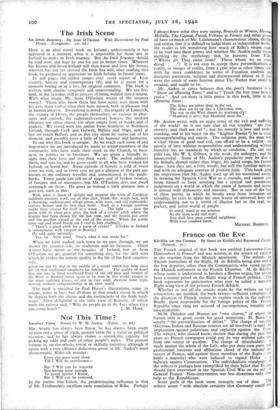Not This Time ?
Another Time. Poems by W. H. Auden. (Faber, 7s. 6d.) MR. AUDEN has always been fluent, he has always been ready to turn out a piece of slack, gossipy verse for a social or political occasion, and he has always shown a remarkable capacity for picking up odds and ends of other people's styles. The present volume is, on the whole, trivial or skilfully imitative, although it opens with a very effective dedicatory poem in Mr. Auden's most characteristic Blake-ish manner: Every eye must weep alone
Till I Will be overthrown—
But I Will can be removed Not having sense enough To guard against I Know But I Will can be removed.
In the poems that follow, the predominating influence is that
of Mr. Leishmann's excellent early translation of Rilke. Perhaps I always knew what they were saying, Brussels in Winter, Herrn*, Melville, The Capital, Pascal, Voltaire at Ferney and other poems all have so much of Mr. Leishmann's characteristic idiom, rhythm and syntax, that it is difficult to judge them as independent works: the reader is left wondering how much of Ftilke's vision ought to be read into these poems and whether Mr. Auden really means anything by the mythology that he borrows _from Rilkt (" Where do They come from? Those whom we so much dread. . . .") It is not easy to accept these personifications as reality, or images of reality, from a poet who at other times talks with far more confidence in terms of Freudian analysis and discusses patriotism, religion and disinterested labour as if they were the result of some fixation about The Father that could he avoided, and ought to be.
Mr. Auden at times believes that the poet's business is to "Show an affirming flame" and to "Teach the free man how to praise." And yet there is little praise in this book, little of the affirming flame:
The fishes are silent deep in the sea, The skies are lit up like a Christmas tree, The star in the West shoots its warning cry: "Mankind is alivz, but Mankind must die."
Mr. Auden writes with an acute sense of the evil and suffering of the world: he is not sure that all our troubles "are from eternity, and shall not fail " ; but his remedy is love and under- standing, and at his worst (in the "Lighter Poems ") he is cruel, uncomprehending and unjust. The religious poet, the man with a clear vision of good and evil, can afford to be a satirist: the apostle of love without responsibility and understanding without humility has no standards by which to condemn. He can only poke fun, like W. S. Gilbert, at the weak, the unhappy, and the unsuccessful. Some of Mr. Auden's popularity may be due to his ballads, dismal rather than tragic, his jaded songs his funeral blues : here they are, a little wordy, but still the familiar mixtur; and with no adequate contrast of positive faith. This book gives the impression that Mr. Auden used up all his emotional energy in treating the Spanish Civil War as a crusade and cannot now bring himself to form anything but a cynical and pessimistic judgement on a world in which the cause of honesty and justice is tainted with dishonesty and injustice. But in one of the best of these poerni, in which he breaks away from imitation and triviality, he tries to apply his own lesson of universal love and understanding not to a world of illusion but to the real, im- perfect, and active world of people:
0 stand, stand at the window As the tears scald and start; You shall love your crooked neighbour With your crooked heart. MICHAEL ROBERTS.






























 Previous page
Previous page